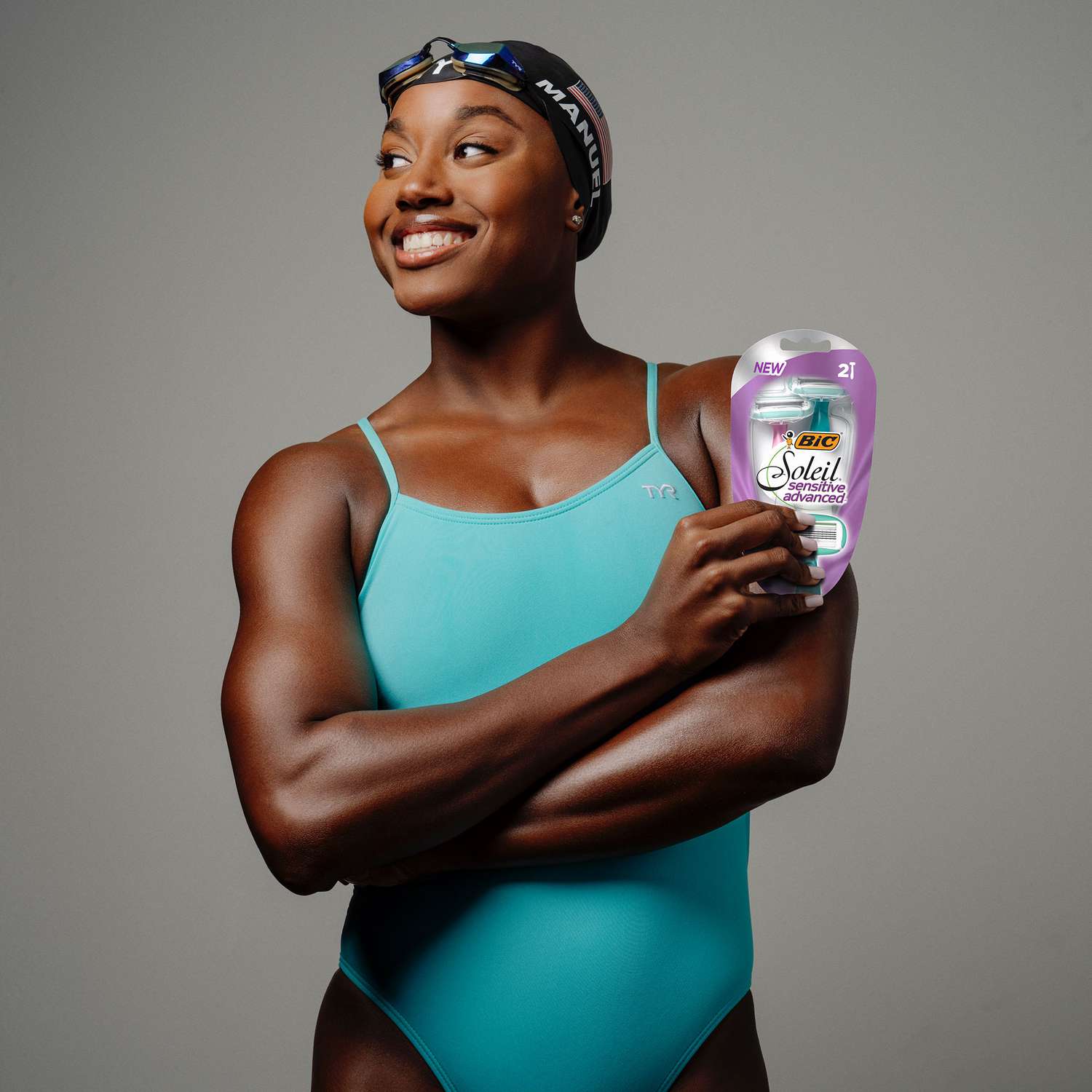Simone Manuel: Olympic Champion and Trailblazer in American Swimming
Simone Manuel has established herself as one of the most significant figures in contemporary swimming, combining elite competitive success with profound cultural impact that extends far beyond the pool. At 27, she has not only accumulated Olympic gold medals and world records but has fundamentally shifted perceptions about who belongs in competitive swimming through her historic achievements and thoughtful advocacy for inclusion.
Early Life and Swimming Introduction
Born in Sugar Land, Texas on August 2, 1996, Manuel was raised in a household that valued both academic achievement and athletic participation. Her parents, Marc and Sharron Manuel, encouraged their children to pursue swimming primarily for water safety—a decision with particular significance given historical barriers that limited swimming access and education in Black communities across America.
Manuel began swimming lessons at age 4, initially approaching the sport as a necessary life skill rather than a competitive pursuit. However, her natural aptitude in the water quickly became apparent, leading to participation in local swim clubs where her exceptional speed and technical proficiency distinguished her from peers.
“Even in those early years, there was something distinctive about Simone’s feel for the water,” recalled her youth coach Greg Livingston. “Most young swimmers fight against the water, but she seemed to work with it instinctively. That natural efficiency is something you can refine but not really teach.”
This natural talent was matched by an uncommon competitive focus that manifested early in Manuel’s development. While many children approached swimming as primarily recreational, Manuel displayed the disciplined work ethic and goal-oriented mindset that would later define her professional career.
As her competitive involvement deepened, Manuel faced the reality experienced by many Black swimmers: the discomfort of often being the only person of color at meets and training sessions. These experiences, while challenging, helped shape her understanding of her potential significance beyond personal achievement.
“When you rarely see anyone who looks like you in a sport, you become acutely aware that your presence matters,” Manuel explained in a 2019 interview. “I didn’t fully understand the implications when I was younger, but I knew I was often the only Black girl at meets, and that made me feel both isolated and determined.”
Developmental Years and Stanford Excellence
Manuel’s competitive trajectory accelerated during her high school years, when she emerged as one of America’s most promising sprint freestyle specialists. Training with the First Colony Swim Team in Sugar Land, she began breaking age group records and qualifying for progressively more prestigious national competitions.
Her development coincided with increased national attention on diversity in swimming following Cullen Jones’ breakthrough Olympic performance in 2008. As Manuel collected national age group championships and qualified for her first international competitions, she began to understand her potential to expand representation in the sport while pursuing her personal excellence.
The pivotal decision in Manuel’s development came with her commitment to Stanford University, where she would train under legendary coach Greg Meehan while pursuing academic excellence at one of America’s most prestigious institutions. This choice reflected the Manuel family’s emphasis on educational achievement alongside athletic pursuits—a balanced approach that has characterized Simone’s career.
At Stanford, Manuel’s development accelerated dramatically. Collaborating with a world-class coaching staff and training alongside other elite swimmers, she refined her technique, enhanced her race strategy, and built the physical capacity required for international success. The results were immediate and impressive: as a freshman, she broke the American record in the 100-yard freestyle and began accumulating NCAA championships.
By the conclusion of her collegiate career, Manuel had established herself as one of the most decorated swimmers in NCAA history, winning 14 NCAA championships (six individual and eight relay titles) and breaking numerous American and NCAA records. Perhaps most significantly, her collegiate experience provided the competitive foundation and technical refinement that would prepare her for Olympic success.
Beyond specific achievements, Stanford provided Manuel with an environment that nurtured her intellectual development alongside her athletic growth. This integration of academic and athletic excellence would later inform her thoughtful approach to advocacy and public communication around inclusion in swimming.
Olympic Triumph and Historic Achievement
While Manuel had established herself as an elite swimmer through national championships and NCAA success, her global breakthrough came at the 2016 Rio Olympics, where she delivered one of the most historically significant performances in swimming history.
Competing in the women’s 100-meter freestyle final, Manuel touched the wall in an Olympic record time of 52.70 seconds, tying with Canada’s Penny Oleksiak for gold in an unprecedented shared victory. This performance made Manuel the first Black woman to win an individual Olympic gold medal in swimming—a watershed moment that transcended sport to become a cultural milestone.
The significance of this achievement was immediately apparent, with Manuel herself acknowledging the historical weight of the moment in post-race interviews: “This medal is not just for me, it’s for a whole bunch of people who have come before me and been an inspiration to me,” she said, visibly emotional. “It’s for all the people after me who believe they can’t do it. I just want to be an inspiration to others that you can do it.”
Beyond the cultural significance, the victory represented an exceptional athletic achievement. Manuel’s technical execution in the final was flawless, with race analysis highlighting her perfect rhythm, exceptional underwater work, and tactical intelligence in managing her energy distribution throughout the race.
Manuel added three more medals in Rio: another gold in the 4×100-meter medley relay and silver medals in both the 50-meter freestyle and 4×100-meter freestyle relay. This four-medal performance established her as one of the stars of the American team and created a platform that would allow her to address larger issues around diversity and inclusion in swimming.
The immediate aftermath of Rio transformed Manuel’s profile, bringing unprecedented media attention, commercial opportunities, and public recognition. More significantly, it positioned her as a powerful symbol of possibility for young Black swimmers who rarely saw themselves represented at swimming’s highest levels.
Technical Excellence and Racing Philosophy
Standing 5’10” with the lean musculature ideal for sprint swimming, Manuel has refined a racing approach that maximizes her natural advantages while addressing potential limitations. Swimming analysts have identified several distinctive elements that characterize her performance at its best:
- Superior Underwater Phases: Manuel’s underwater dolphin kicks and breakout timing are consistently rated among the best in women’s swimming, providing critical advantages at the start and turns of sprint events.
- Exceptional Back-Half Speed: Unlike many sprinters who fade in the closing meters, Manuel frequently negative-splits her 100-meter races, producing her fastest swimming when competitors are slowing—a pattern that has led to numerous come-from-behind victories.
- Technical Consistency Under Pressure: In championship finals, Manuel demonstrates remarkable ability to maintain perfect stroke mechanics despite the physical and psychological pressure of high-stakes competition.
- Tactical Adaptability: Beyond physical execution, Manuel has demonstrated sophisticated race strategy, adjusting her approach based on competitors, conditions, and specific race dynamics.
Renowned technique coach Russell Mark has noted Manuel’s distinctive stroke characteristics: “What separates Simone’s freestyle is the perfect balance between power and efficiency. She generates tremendous propulsion without the excessive energy expenditure you see with many sprinters. This efficiency becomes particularly advantageous in the closing meters of races.”
This technical excellence is supported by meticulous attention to training details and a remarkable ability to execute race plans precisely under championship pressure. Coach Greg Meehan has frequently highlighted Manuel’s exceptional competitive temperament—the ability to deliver her absolute best performance when stakes are highest.
“The most elite competitive quality is performing to your potential when it matters most,” Meehan explained in a coaching seminar. “Simone has consistently demonstrated that ability throughout her career. Her best times almost always come in the biggest races, which speaks to both her physical preparation and psychological approach.”
World Championship Dominance and Continued Excellence
Following her Olympic breakthrough, Manuel confirmed her status as the world’s premier female sprint freestyler at the 2017 FINA World Championships in Budapest. There, she delivered an even more impressive performance than in Rio, winning five gold medals and a bronze while setting American records in multiple events.
Her victory in the 100-meter freestyle was particularly noteworthy, as Manuel defeated Swedish sprint legend Sarah Sjöström with a perfectly executed race that showcased her tactical intelligence and closing speed. This performance, coming without the element of surprise that existed in Rio, demonstrated that Manuel’s Olympic success was no fluke but rather the emergence of a dominant champion.
The 2019 World Championships in Gwangju, South Korea, brought additional success, with Manuel winning four gold medals and three silvers. Her victory in the 100-meter freestyle made her the first American woman to win back-to-back world titles in the event, cementing her status as one of the most accomplished sprinters in American swimming history.
These championship performances, combined with consistent success in international competitions between major events, established Manuel as not just a historic figure but as the definitive female sprinter of her era. Swimming historians have noted the comprehensive nature of her achievements: Olympic gold, world championships, American records, and NCAA titles across multiple events and formats.
“What distinguishes Simone’s competitive record is its completeness,” observed swimming historian John Lohn. “She has excelled in every competitive format—short course yards, long course meters, individual events, relays—and at every level from NCAA to Olympics. That versatility across formats is remarkably rare.”
Confronting Health Challenges and Demonstrating Resilience
Manuel’s career trajectory faced its most significant challenge in 2021 when she publicly disclosed her diagnosis with overtraining syndrome—a condition characterized by persistent fatigue, performance decline, and physiological disruptions resulting from training volume exceeding recovery capacity.
This condition, which had affected her training throughout early 2021, culminated in a shocking result at the U.S. Olympic Trials when Manuel failed to qualify for the final of the 100-meter freestyle—the event in which she was the defending Olympic champion. With remarkable resilience, she regrouped to win the 50-meter freestyle days later, securing her place on the Tokyo Olympic team in dramatic fashion.
Manuel’s decision to publicly discuss her health struggles represented an important moment in elite sports, helping destigmatize the physical and mental health challenges faced by high-performance athletes. Rather than offering vague explanations for her performance fluctuations, she provided detailed insight into her condition, including the complex interplay between physical symptoms and psychological pressure.
“Being a Black person in America played a part in my depression,” Manuel explained candidly after the Trials. “This last year for the Black community has been brutal. I can’t say that wasn’t something that I saw, that I felt. It’s not something I can ignore, and it was just another factor that can influence you mentally in a draining way.”
This forthright acknowledgment of how societal factors affected her health represented a significant evolution in how elite athletes discuss the intersection of performance, identity, and social context. Mental health experts praised Manuel’s transparency for helping normalize these conversations within sports communities.
The Tokyo Olympics provided a fitting demonstration of Manuel’s resilience, as she helped the U.S. women’s 4×100-meter freestyle relay team to a bronze medal despite her abbreviated preparation. This performance, while not matching her Rio medal haul, showcased her ability to contribute at the highest level even under challenging circumstances.
Advocacy and Cultural Impact
Beyond her competitive achievements, Manuel has established herself as one of swimming’s most important advocates for diversity and inclusion. Rather than simply serving as a symbolic figure, she has engaged substantively with the complex barriers that have historically limited swimming participation in communities of color.
This advocacy work began even before her Olympic triumph, with Manuel using her platform as an elite NCAA swimmer to address challenges faced by athletes of color in predominantly white sports. Following Rio, her expanded visibility created opportunities to address these issues with greater reach and impact.
Unlike many athletes who offer generalized statements about diversity, Manuel has consistently provided nuanced perspectives informed by both personal experience and careful consideration of systemic factors. Her public comments typically acknowledge both progress made and the significant work still required to make swimming truly inclusive.
“The sport has certainly become more diverse than when I started, but we’re still far from where we need to be,” Manuel explained in a 2021 interview. “True inclusion isn’t just about having a few Black swimmers at the elite level—it’s about addressing the systemic barriers that limit access to swimming education and facilities in many communities.”
These barriers include historical factors like segregated pools and beaches during the Jim Crow era, contemporary issues like limited access to facilities in underserved communities, and cultural factors stemming from generational disconnection from swimming. Manuel has consistently highlighted how these interlocking challenges require comprehensive approaches rather than symbolic gestures.
Her advocacy has extended beyond public statements to include practical initiatives aimed at expanding swimming access. This includes partnering with the USA Swimming Foundation to support programs providing free or low-cost swimming lessons in underserved communities and working with sponsors to direct resources toward expanding participation opportunities.
“What impresses me about Simone’s approach to advocacy is that she understands both the significance of representation and the need for structural change,” noted Dr. Shaun Anderson, co-founder of Diversity in Aquatics. “She recognizes that while her visibility matters tremendously, lasting progress requires addressing the systems that create disparities in the first place.”
This sophisticated understanding has made Manuel an important voice in swimming governance, with national federations and the International Swimming Federation (FINA) increasingly seeking her perspective on inclusion initiatives. Her influence extends beyond swimming to broader conversations about race and opportunity in American sports.
Commercial Impact and Media Presence
Manuel’s Olympic success and compelling personal story have created significant commercial opportunities, with major brands recognizing both her athletic credentials and her cultural significance. Her endorsement portfolio includes partnerships with companies like Nike, Coca-Cola, Toyota, and TYR—the latter resulting in a groundbreaking sponsorship agreement that included an “inclusion rider” requiring the company to prioritize diversity in its promotional activities.
This innovative contract provision, unprecedented in swimming sponsorships, demonstrated Manuel’s commitment to leveraging her commercial influence to create broader industry change. Rather than simply benefiting personally from endorsement revenue, she has consistently used her market value to advance inclusion throughout swimming’s commercial ecosystem.
Manuel’s media presence reflects similar thoughtfulness, with carefully selected appearances and partnerships that align with her values. Unlike athletes who pursue maximum visibility regardless of context, she has prioritized platforms that allow substantive discussion of both her athletic achievements and her advocacy work.
This selective approach extends to her social media presence, where she balances training content and competition updates with educational material about swimming history, access disparities, and inclusion initiatives. This strategy has created an authentic digital presence that serves both promotional and educational purposes.
“Simone represents a new model of athlete branding,” observed sports marketing specialist Janelle Wells. “She’s built commercial value not just through competitive success but through authentic engagement with significant social issues. That combination of athletic excellence and meaningful advocacy creates distinctive appeal to both sponsors and audiences.”
Academic Excellence and Life Beyond Swimming
Consistent with her family’s emphasis on educational achievement, Manuel has maintained academic excellence alongside her athletic pursuits. At Stanford, she earned her degree in communications while managing the demands of elite training—a balance that required exceptional time management and disciplined focus.
This academic foundation has informed her articulate public communication and thoughtful engagement with complex issues. Unlike many athletes who struggle to express nuanced perspectives, Manuel consistently demonstrates the critical thinking and communication skills developed through her educational experiences.
Looking toward her future beyond competitive swimming, Manuel has expressed interest in media, public communication, and continuing her advocacy work. Her experiences as a swimming analyst for NBC during competitions have demonstrated her natural ability to translate technical insights into accessible commentary.
“I’m passionate about staying connected to swimming in ways that help grow the sport,” Manuel explained when discussing her long-term aspirations. “Whether that’s through media work, mentoring younger swimmers, or continuing advocacy efforts, I want to help create the inclusive swimming culture I wish had existed when I was a young athlete.”
This forward-looking perspective reflects Manuel’s understanding that her impact will ultimately extend beyond her competitive career—that her most significant contribution may come through institutional changes she helps create in swimming culture.
Legacy and Historical Significance
As Manuel continues her competitive career, swimming historians have already begun assessing her place in the sport’s evolution. Beyond specific medals and records, her significance encompasses several dimensions that distinguish her from many champions who preceded her:
- Historical Barrier-Breaking: As the first Black woman to win individual Olympic gold in swimming, Manuel occupies a permanent place in both sporting and cultural history, alongside figures like Jesse Owens and Jackie Robinson who transcended athletic achievement to become symbols of possibility.
- Competitive Excellence: Independent of her cultural significance, Manuel’s athletic achievements—Olympic and world championships, American records, NCAA dominance—place her among the most accomplished American swimmers of her generation.
- Advocacy Impact: Unlike many pioneering athletes who focused solely on competitive success, Manuel has actively engaged with the structural issues affecting diversity in swimming, using her platform to address systemic barriers rather than simply serving as a symbolic figure.
- Articulate Voice: Manuel’s thoughtful public communication has elevated discussions about inclusion in swimming beyond simplistic narratives, helping create more sophisticated understanding of both historical contexts and contemporary challenges.
Swimming historian Dr. Kevin Dawson, author of “Undercurrents of Power: Aquatic Culture in the African Diaspora,” has noted the particular significance of Manuel’s achievements given swimming’s complex racial history in America: “For a sport that was actively segregated within living memory, having a Black woman not merely participate but dominate represents a profound historical evolution. Manuel’s success challenges centuries of harmful stereotypes about Black people and water.”
This historical weight has created both opportunity and burden—the chance to create meaningful change balanced against expectations that extend far beyond those faced by most athletes. Manuel has navigated these complex dynamics with remarkable maturity, acknowledging her symbolic importance while maintaining focus on her personal excellence and specific advocacy goals.
“I recognize the significance of what I’ve accomplished,” Manuel reflected after Tokyo. “But I’ve always tried to maintain balance—competing for myself and my own goals while understanding that my presence and voice matter beyond personal achievement. That’s a responsibility I take seriously without letting it become overwhelming.”
As younger swimmers inspired by Manuel begin emerging at elite levels, her most enduring legacy may be the generation of diverse talent she helped motivate. Already, swimming officials have noted increased participation from underrepresented communities following her Olympic triumph, suggesting that the “Manuel Effect” may reshape American swimming demographics over coming decades.
For the sport itself, Simone Manuel represents both a historic milestone and an ongoing challenge—a celebration of barriers broken and a reminder of the substantial work still required to make swimming truly inclusive. In both her competitive excellence and her committed advocacy, she has redefined possibilities while illuminating the path toward a more equitable future for the sport she has transformed.








